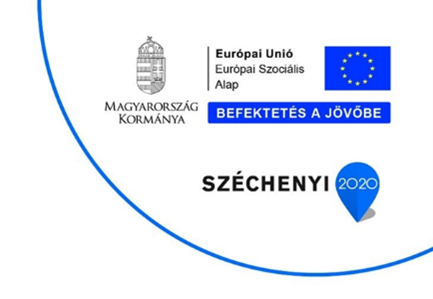

Reference number: EFOP-3.5.1-16-2017-00016
The project is co-financed by the European Social Fund with the support of the European Union.
Beneficiary: Budapest University of Economics and Business
Consortium partner: the Pannon Development Foundation
Project title: innovative solutions for the development of dual training in management
Start of project implementation: 01.07.2017.
End of project implementation: 31.03.2022.
Contracted aid amount: HUF 347 064 433
Rate of aid: 100%
The overall objective of the project is to develop the University's education system in such a way that, as a result of the interventions aimed at developing the dual education system, students and teachers, as well as the University, are better able to respond to labour market challenges and meet labour market needs. Our aim is to improve the performance and accessibility of university education.
The immediate objective of the project is to make a substantial contribution to reducing the difficulties graduates face in starting their careers, to acquire soft skills in addition to the professional knowledge required by the labour market, to ensure a closer and more meaningful link between training and the labour market, and to strengthen the social and regional role of training.
The project aims to meet the needs of the institution's students with less developed dual placements in the region, as well as the needs of the dual business organisations associated with the institution. Students need to have their knowledge and creative abilities met as fully as possible. There is a need to support the innovation activities of businesses in the environment, with educational feedback. It is in the vital interest of the civil society to increase its knowledge base, one element of which is to be informed about developments and their results. It is from these groups that the project aims to meet these needs, and it is from these groups that the project's direct and indirect target groups and stakeholders are drawn.
Based on a set of objectives developed on the basis of sectoral needs, the scope of the project has been designed, which consists of the following main activities:
- Developing a dual training system
- Dual Coordination Centre
- Dual content and curriculum development
- Dual laboratory development
- Developing trainers and students
- Dual scholarship scheme
- Internationalisation of dual training
- Dual dissemination
- Benefit analysis of dual training research
- Practical skills methods, content and programmes
- Successful Master-Student relationship research
- Methodological development of dual partners' professionals
- Professional programmes supporting dual training
- Regional integration of practice-oriented programmes
- Dual tool development
We aim to achieve the following results through the implementation of the application activities:
- Stakeholders can meet the professional and human development needs of central and local government, the local community, businesses, students and academics;
- appropriate Dual Training Organisation coordination to achieve training-education cooperation based on mutual respect of interests;
- the attractiveness created by dual training participants extends to the labour market in the surrounding areas;
- a high-quality training system can provide a career path for students in training;
- As a result of corporate partnerships, academic trainers are constantly modernising the curriculum and its methodology through direct impulses;
- the university can involve practitioners in its training in the long term;
- with its practice-oriented teaching methodology, contributes to increasing corporate innovation, strengthening problem-solving and critical thinking and working, and thereby increasing efficiency;
- the entrepreneurship propensity of young people leaving dual training in the regions concerned is improved;
by creating new knowledge, the territorial competitiveness and export performance of the region concerned will improve.
